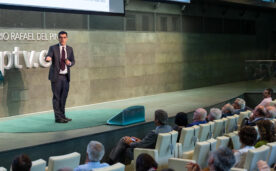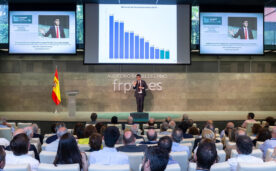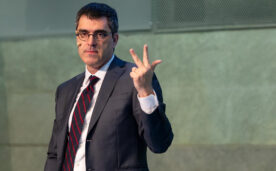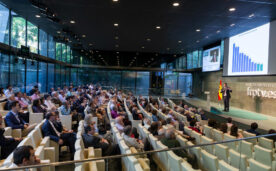Spain at the crossroads of competitiveness and productivity: what will the next crisis look like and how can we prepare the Spanish economy to overcome it successfully?
Summary:
On 23 May 2019, Jesús Fernández-Villaverde gave a lecture at the Rafael del Pino Foundation entitled "Spain at the crossroads of competitiveness and temporality". Fernández-Villaverde, Professor of Economics at the University of Pennsylvania, indicated that, after a long period of expansion, in the second half of 2008, the Spanish economy entered a deep crisis, which led to the loss of almost 10 % of GDP. At the end of 2013, a recovery began. Today, we are 16% from the bottom of the recession and 5% above the 2008 peak. However, the well-being of Spaniards is no higher than at the peak of 2008, because we were living beyond our means. Fortunately, we have been expanding for almost six years. Part of this expansion is due to domestic factors, in particular wages and house prices that returned to levels more consistent with the Spanish economy. Part of the growth also came from outside, in particular from a very expansionary monetary policy of the ECB. Today it is important to think about where we are and where we are going, because another crisis is going to come. We don't know when, but it will come, because crises always come. What we have been doing for fifty years in Spain is not preparing for the next crisis. That is why we must break this dynamic. Nobody knows when the crisis will come or what it will be like, because the economy is complex, with non-linear relationships. That is why we cannot accurately predict beyond six months or a year. What we can do is look at the recent history of the Spanish economy and think about the reasons that have led to the crises. One of them is an expansive monetary policy, which has come to us from outside, and which we did not need. This was the case in 1992, 2008 and previous years. We have had crises when we have had high levels of leverage and a lot of debt. The third reason is that we are a small country that is very exposed to the rest of the world, particularly because of our dependence on foreign energy. Finally, we are a country that has had delicate internal politics, for example, the huge political paralysis of the period 1973-1979. History does not repeat itself, but it rhymes. These problems that we have had historically are still on the table. The next crisis will be a combination of these failings of the Spanish economy, the five weaknesses of the Spanish economy: the public accounts, productivity, the structure of exports, the very delicate situation of the financial system and the political economy. In the absence of a monetary policy of its own, the fundamental instrument for managing the economic cycle is fiscal policy, but it is now in a very bad situation in the short, medium and long term. In the short term, we have a structural deficit of 2.5%. The deficit has been stabilising, but only because the economy has been doing better, but it should have been reduced faster than it has since 2015. But, since that year, governments have been spending more. The Spanish economy is now where it should be in the long term, which means that this structural deficit is what it should be in the medium and long term. The problem with this is that it does not reduce the debt to GDP ratio of 97%. Moreover, what will happen the day a recession hits? Well, revenue will fall, spending will increase and interest rates will rise, so the deficit may rise again to 10%, which cannot be financed. This is a problem that nobody is talking about. There is also a long-term problem, which is the sustainability of the welfare state because of the falling birth rate and the increase in life expectancy. This will mean that the population, without immigration, will fall to 25 million, making it difficult to pay for health care and pensions. If immigrants are brought in to overcome this situation, the Spanish population would reach 40% of the total, which would mean that we would no longer be a European country. There is no political system that can digest this. Moreover, there is a more subtle problem: a low-skilled immigrant does not help because he contributes little and then has to collect a pension. The second weakness is productivity. It is key that it grows because the only way to produce more in the long term is through productivity growth. Productivity in 1981 and in 2014 is the same, but you cannot have a modern country and a social protection system if productivity does not grow. Third weakness: the structure of exports. One of the great success factors of the Spanish economy during the recovery was its export capacity. But as a country that already exports more than France and Italy as a percentage of GDP, Spain faces enormous problems for its exports in the medium term. First, exports are concentrated in sectors highly exposed to technological change, which are undergoing a fundamental transformation. In the longer term, we have the problem that production in these sectors may go elsewhere. The second problem is that the destination of exports is overly concentrated in Western Europe and with little growth in Asia. Spain does not have a significant presence in India, which will be the big economy in thirty years' time, or in China. Moreover, exports to India are declining. The third problem is that the level of sophistication of exports is still very low. We produce cars, but the range is low. This makes our exports very sensitive both to the economic cycle and to small changes in the exchange rate. This is not a problem for high-end cars. More generally, Spain is totally out of step with the new global technological economy. Our big companies are the big companies of the 20th century, not the big companies of the 21st century. Fourth weakness: the delicate situation of the financial system. The financial system has a very low level of capital, the lowest in the European Union. It has 213 billion in equity, but 40 billion of this is tax credits, which is not really capital. Moreover, Spanish banks are not profitable, they do not make money. Their return on equity is only 5.4%, when the historical rate for banks is 7%, and we are now at the peak of the cycle. Moreover, a large part of this return is accounted for by the foreign subsidiaries of the big banks. The problem is that you cannot have a functioning economy without a profitable financial sector. Last weakness: Spain's political economy. We have a very fragmented Congress of Deputies, so any kind of legislative agenda is going to be very complicated. We have been like this since 2014, with no legislative work on major reforms. The results of 28 April suggest that a large part of the electorate rewards the short-termism of election Fridays, which will lead us into a very harmful dynamic in which responsible politicians will find themselves in front of a very unreceptive audience. An example of this is the two-year suspension of the sustainability factor for pensions. This was irresponsible because pensioners had been very well protected during the crisis. The situation in the European Union is not going to help. Spain had an ally in Europe to push for reforms, which was the United Kingdom. But the British have decided to leave. Without them, the French and Germans will bring out the protectionist and interventionist instinct within them, and Spain will therefore have a lot of trouble getting the EU to do what it needs to do. The good news is that something can be done about it, through a strategy of reforms. Public accounts, productivity, the structure of exports and the situation of the financial system have to be tackled. What can be done? We need to reduce the deficit much faster and put an end to social Fridays. We should already be in surplus, which means we have to increase revenue and reduce public spending, which implies painful measures that nobody will like. We have to move towards a flat-rate VAT that raises more revenue. We have to cut things that people are not going to like. And we have to solve the problems of the long-term sustainability of the welfare state, which means explaining the demographic problems to the Spanish people and dealing with immigration policy in a sensible way. Both have to be done rationally. We must also have a more solid budgetary process. With regard to productivity, we need to get to grips with education, and do it as soon as possible because the changes will be felt later on. We need an education system that works, with quality teaching materials and not ideological ones. The university is a tremendous problem. The economics curricula in Spain are horrendous, because they are not providing the training they should be providing. In relation to vocational training, people leave without knowing things they need in their day-to-day lives. And, more importantly, there is no interest in civil society to change things. In the labour market we have a badly designed labour framework, which causes unemployment to soar when crises come. The labour framework allows for duality between permanent and temporary workers, but does not allow for rational collective bargaining. We need a regulatory framework that allows competition. We need institutions that work, not the colonisation of the public sector by political parties. A very fragmented political system is going to put things on the table that are going to be very tempting. One of them is empty Spain. It is empty because it makes sense and it will become emptier, because the economy of the 21st century is an economy of agglomeration. In Spain there is a region that has a future, Madrid, which has to become the third great metropolis of Europe. It has to grow to eight or nine million people and become the economic centre of the country. But the political system is not going to want to face this, when what we should be concerned about is the well-being of the people, not the well-being of the territories. And the well-being of the Spanish people depends on Madrid being a great European metropolis and, furthermore, competing with Miami to be the capital of the Spanish-speaking world. The financial system cannot be demonised, nor can a Supreme Court invent things like floor clauses. We must also remember that there are very serious limits to redistribution, so as not to impede long-term economic growth.
The Rafael del Pino Foundation is not responsible for the comments, opinions or statements made by the people who participate in its activities and which are expressed as a result of their inalienable right to freedom of expression and under their sole responsibility. The contents included in the summary of this conference are the result of the debates held at the meeting held for this purpose at the Foundation and are the responsibility of their authors.
The Rafael del Pino Foundation is not responsible for any comments, opinions or statements made by third parties. In this respect, the FRP is not obliged to monitor the views expressed by such third parties who participate in its activities and which are expressed as a result of their inalienable right to freedom of expression and under their own responsibility. The contents included in the summary of this conference are the result of the discussions that took place during the conference organised for this purpose at the Foundation and are the sole responsibility of its authors.









